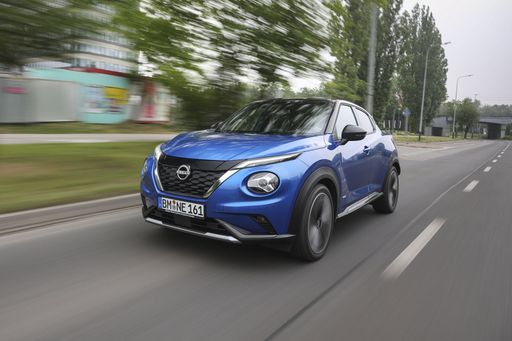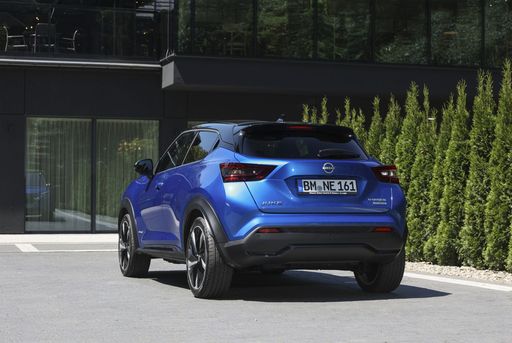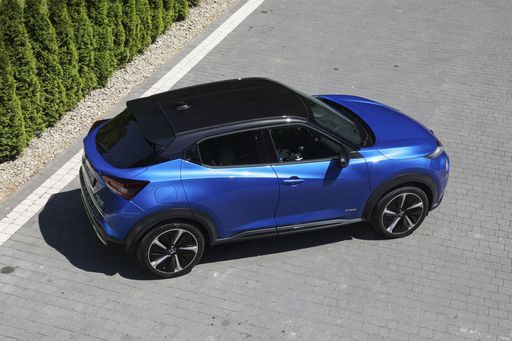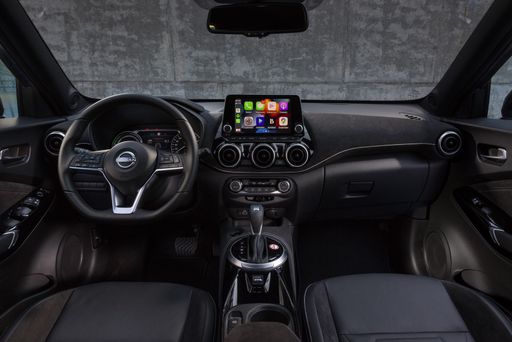Nissan Juke vs VW Tiguan – Performance, range & efficiency compared
Two cars, one duel: Nissan Juke meets VW Tiguan.
Which one wins in performance, efficiency and value for money? Find out now!
Costs and Efficiency: Looking at overall running costs, both models reveal some interesting differences in everyday economy.
Nissan Juke has a convincingly advantage in terms of price – it starts at 21400 £, while the VW Tiguan costs 32800 £. That’s a price difference of around 11400 £.
Fuel consumption also shows a difference: VW Tiguan manages with 0.40 L and is therefore decisively more efficient than the Nissan Juke with 4.70 L. The difference is about 4.30 L per 100 km.
Engine and Performance: Under the bonnet, it becomes clear which model is tuned for sportiness and which one takes the lead when you hit the accelerator.
When it comes to engine power, the VW Tiguan has a clearly edge – offering 272 HP compared to 143 HP. That’s roughly 129 HP more horsepower.
In acceleration from 0 to 100 km/h, the VW Tiguan is significantly quicker – completing the sprint in 5.90 s, while the Nissan Juke takes 10.10 s. That’s about 4.20 s faster.
In terms of top speed, the VW Tiguan performs noticeable better – reaching 242 km/h, while the Nissan Juke tops out at 180 km/h. The difference is around 62 km/h.
There’s also a difference in torque: VW Tiguan pulls decisively stronger with 400 Nm compared to 200 Nm. That’s about 200 Nm difference.
Space and Everyday Use: Cabin size, boot volume and payload all play a role in everyday practicality. Here, comfort and flexibility make the difference.
Both vehicles offer seating for 5 people.
In curb weight, Nissan Juke is noticeable lighter – 1274 kg compared to 1599 kg. The difference is around 325 kg.
In terms of boot space, the VW Tiguan offers clearly perceptible more room – 652 L compared to 422 L. That’s a difference of about 230 L.
In maximum load capacity, the VW Tiguan performs evident better – up to 1650 L, which is about 345 L more than the Nissan Juke.
When it comes to payload, VW Tiguan a bit takes the win – 533 kg compared to 427 kg. That’s a difference of about 106 kg.
Who comes out on top?
Overall, the VW Tiguan shows itself to be outperforms in nearly all aspects and secures the title of DriveDuel Champion.
It convinces with the more balanced overall package and proves to be the more versatile choice for everyday use.

VW Tiguan
Nissan Juke
The Nissan Juke stands out with its distinctive design and bold styling, making it a popular choice for those seeking something different on the road. Its interior cleverly combines modern technology with comfort, offering an enjoyable driving experience for both the driver and passengers. Despite its compact size, the Juke provides a surprising amount of space and versatility, making it suitable for urban adventures and weekend getaways alike.
details @ germany.nissannews.com
@ germany.nissannews.com
 @ germany.nissannews.com
@ germany.nissannews.com
 @ germany.nissannews.com
@ germany.nissannews.com
 @ germany.nissannews.com
@ germany.nissannews.com
VW Tiguan
The VW Tiguan presents itself as a versatile and practical option in the SUV market, combining a stylish design with a spacious and comfortable interior. It offers a smooth driving experience, making it well-suited for both urban environments and longer journeys. With its focus on safety and innovative technology features, the Tiguan remains a compelling choice for families and adventurers alike.
details @ Volkswagen
@ Volkswagen
 @ Volkswagen
@ Volkswagen
 @ Volkswagen
@ Volkswagen
 @ Volkswagen
@ Volkswagen
 @ Volkswagen
@ Volkswagen
 @ Volkswagen
@ Volkswagen

|

|
|
|
|
Costs and Consumption |
|
|---|---|
|
Price
21400 - 30100 £
|
Price
32800 - 51900 £
|
|
Consumption L/100km
4.7 - 6 L
|
Consumption L/100km
0.4 - 8.4 L
|
|
Consumption kWh/100km
-
|
Consumption kWh/100km
-
|
|
Electric Range
-
|
Electric Range
119 - 129 km
|
|
Battery Capacity
0.60 kWh
|
Battery Capacity
19.70 kWh
|
|
co2
107 - 136 g/km
|
co2
8 - 190 g/km
|
|
Fuel tank capacity
46 L
|
Fuel tank capacity
45 - 58 L
|
Dimensions and Body |
|
|---|---|
|
Body Type
SUV
|
Body Type
SUV
|
|
Seats
5
|
Seats
5
|
|
Doors
5
|
Doors
5
|
|
Curb weight
1274 - 1405 kg
|
Curb weight
1599 - 1890 kg
|
|
Trunk capacity
354 - 422 L
|
Trunk capacity
490 - 652 L
|
|
Length
4210 mm
|
Length
4539 mm
|
|
Width
1800 mm
|
Width
1842 - 1859 mm
|
|
Height
1593 mm
|
Height
1656 - 1658 mm
|
|
Max trunk capacity
1237 - 1305 L
|
Max trunk capacity
1486 - 1650 L
|
|
Payload
405 - 427 kg
|
Payload
460 - 533 kg
|
Engine and Performance |
|
|---|---|
|
Engine Type
Petrol, Full Hybrid
|
Engine Type
Plugin Hybrid, Petrol, Petrol MHEV, Diesel
|
|
Transmission
Manuel, Automatic
|
Transmission
Automatic
|
|
Transmission Detail
Manual Gearbox, Dual-Clutch Automatic, Automatic Gearbox
|
Transmission Detail
Dual-Clutch Automatic
|
|
Drive Type
Front-Wheel Drive
|
Drive Type
Front-Wheel Drive, All-Wheel Drive
|
|
Power HP
114 - 143 HP
|
Power HP
130 - 272 HP
|
|
Acceleration 0-100km/h
10.1 - 11.8 s
|
Acceleration 0-100km/h
5.9 - 10.6 s
|
|
Max Speed
166 - 180 km/h
|
Max Speed
198 - 242 km/h
|
|
Torque
200 Nm
|
Torque
220 - 400 Nm
|
|
Number of Cylinders
3 - 4
|
Number of Cylinders
4
|
|
Power kW
84 - 105 kW
|
Power kW
96 - 200 kW
|
|
Engine capacity
999 - 1598 cm3
|
Engine capacity
1498 - 1984 cm3
|
General |
|
|---|---|
|
Model Year
2024
|
Model Year
2024 - 2025
|
|
CO2 Efficiency Class
D, E, C
|
CO2 Efficiency Class
B, G, D, E, F
|
|
Brand
Nissan
|
Brand
VW
|
What drive types are available for the Nissan Juke?
Available configurations include Front-Wheel Drive.
The prices and data displayed are estimates based on German list prices and may vary by country. This information is not legally binding.
